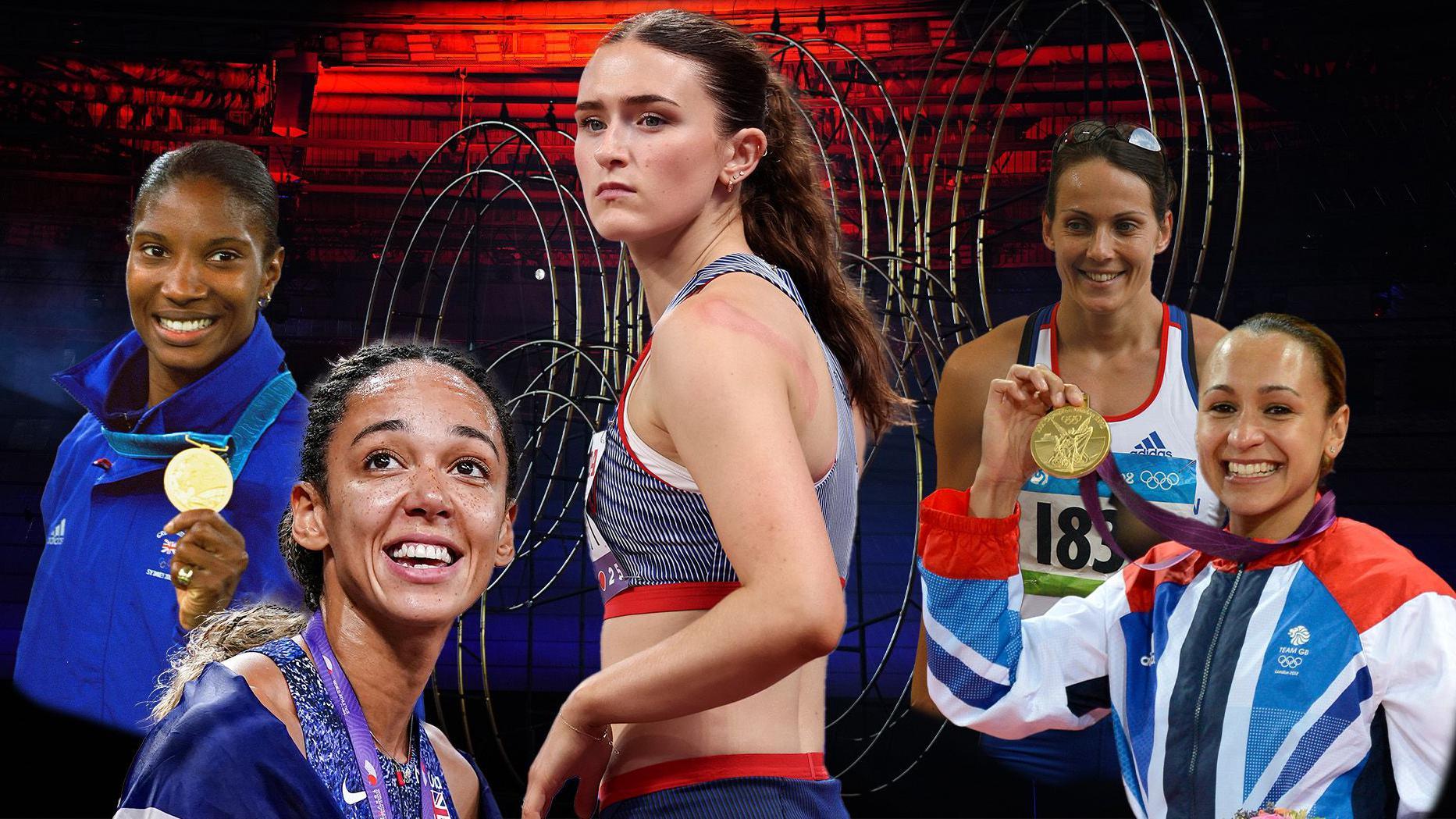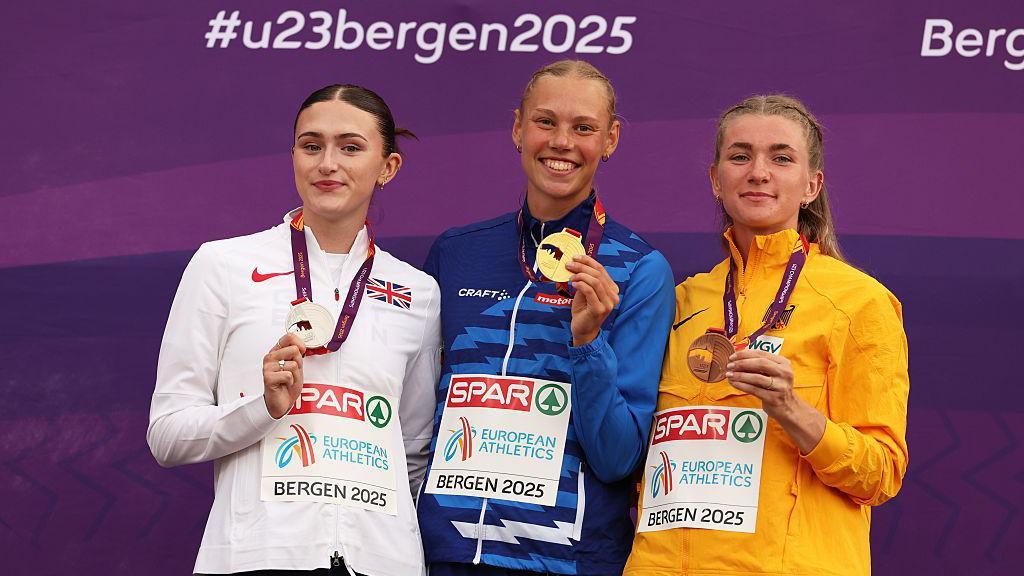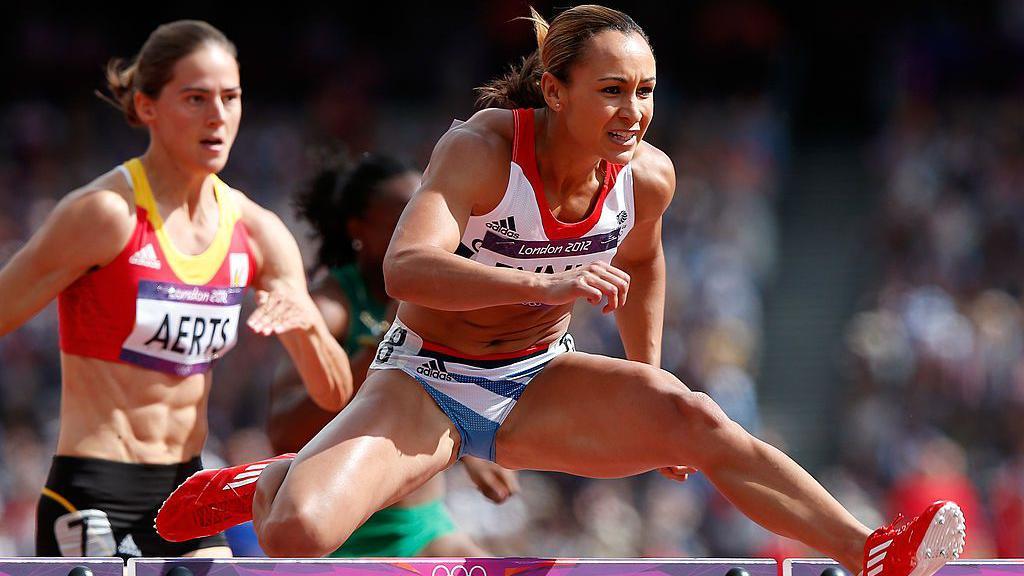Abigail Pawlett’s Fall is a Symbol of the Curse We All Face — Rising Expectations in a World Where Only Gold Matters
In the realm of athletics, few events capture the essence of human perseverance and multidimensional talent as the heptathlon. This grueling competition tests athletes across seven different disciplines, demanding not only physical endurance but also mental fortitude. The heptathlon has seen remarkable successes for British athletes over the years, with icons like Denise Lewis, Kelly Sotherton, Jessica Ennis-Hill, and Katarina Johnson-Thompson earning acclaim and medals on the world stage. However, as the spotlight shines on a new generation of competitors, the expectations and emotional pressures they face have intensified dramatically.
Abigail Pawlett, a young 22-year-old heptathlete from Wales, embodies the complexity of these contemporary challenges. Having made her debut at the World Athletics Championships in Tokyo, she stepped onto the global stage with aspirations as grand as the legacy of her predecessors. Yet, her journey was not without trials. In her opening event, the hurdles, Pawlett experienced a fall, a critical moment that could have defined her career and outlook for the future. Many young athletes dream of Olympic glory, but the pressure to perform often weighs heavily, creating a psychological battleground that few are prepared to navigate.
The modern athlete faces unprecedented scrutiny. With the advent of social media, performances are dissected and critiqued in real time, transforming every setback into a public event. For Pawlett, her fall was not merely a physical stumble; it represented a collision of dreams and reality, aspirations and fears. Each athlete carries a narrative woven with hopes, and for Pawlett, the emotional toll of her fall manifested as disbelief. It was a haunting reminder that in this sport, a single misstep could ripple through an entire career.
Yet, amid the chaos, Pawlett’s resilience shone through. After her fall, instead of succumbing to despair, she rebounded with notable performances, including a personal best of 1.80m in the high jump and a successful heat in the 200m. These feats spotlighted her immense potential, illuminating the idea that setbacks can pave the way for comebacks. An athlete’s journey often involves overcoming “psychological blocks,” as Pawlett noted, which can be far more challenging than the physical demands of the sport itself.
The heptathlon isn’t solely about individual achievement; it’s also a fiercely competitive arena where camaraderie and rivalry coexist. The relationship between athletes like Pawlett and her fellow countrywoman Jade O’Dowda exemplifies this dynamic. They push each other’s boundaries as they simultaneously chase their goals, fostering an environment where respect and competition intertwine. For Pawlett, knowing that her achievements are measured against a backdrop of historical greatness adds another layer of pressure but also a source of inspiration. She recognizes the legacy left by British heptathletes and yearns to etch her name in those annals, driving her commitment to excellence.
Emerging as a Welsh record holder after capturing silver at the European Athletics U23 Championships earlier this year reflects Pawlett’s dedication to her craft. She sacrificed her graduation to make her mark in Bergen, an indication of how deeply she values her athletic aspirations. This choice illustrates the sacrifices required on the path to greatness; prioritizing sports over education might seem radical, yet many athletes find themselves at similar crossroads, sacrificing personal milestones for the pursuit of athletic glory.
Yet not all is devoid of struggle. Injuries and the interruptions imposed by the COVID-19 pandemic have reshaped the competitive landscape, complicating athletes’ trajectories. For Pawlett, missed opportunities at age-grade competitions remain a source of frustration and regret. The uncertainty about what medals might have been claimed in different circumstances is a narrative shared by countless aspiring athletes, echoing the losses experienced during an unprecedented period of global upheaval.
Pawlett rates her silver medal as a defining moment, significantly higher than her debut in Tokyo, highlighting her understanding of priorities in an athlete’s journey. She perceives the Olympic pursuit not merely as the ultimate goal but as a comprehensive journey comprising experience, learning, and continual growth. This perspective reveals a maturation process that transcends immediate results, encompassing a broader understanding of what it means to compete and succeed in high-pressure environments.
The heptathlon’s history resonates with pride for British fans. The void left in the Olympic arena without a British representative on the podium since the delayed Tokyo 2020 Games emphasizes the stakes that athletes like Pawlett and O’Dowda are navigating. Akinsights drawn from previous British successes outline the hope and pressure collectively felt by a new generation. The competition is no longer just against global rivals; it’s also an internal struggle to live up to the standards set by trailblazers who preceded them.
Furthermore, the forthcoming Paris 2024 Olympics loom ahead, heightening the stakes and expectations around these athletes. The prospect of competing on such an illustrious platform only intensifies the demand for excellence. Each athlete must confront not only the challenges of their sport but also the societal pressures dictating what success should look like. For Pawlett, becoming a part of this narrative involves an unyielding commitment to self-improvement, constantly establishing new personal bests while contemplating her ultimate standing among the greats.
As Pawlett continues to train and prepare, the overarching theme of her journey intersects with wider societal dialogues — the burdens of expectation, the psychological impacts of failure, and the relentless pursuit of excellence. Each performance amplifies these existing conversations around mental health in sports, shedding light on the requirement for supportive structures to sustain an athlete’s well-being. The quest for success and the price they are prepared to pay resonate beyond the sporting world, opening discussions regarding the treatment of high performers across diverse industries.
Navigating these complexities, athletes like Abigail Pawlett potentially redefine what success means within the contemporary landscape of sport. No longer just an individual accolade, success encompasses the journey, the resilience built through adversity, and the collaborative spirit fostered by competition and camaraderie. As Pawlett hearts her ambition to raise herself alongside the celebrated British heptathletes, the world watches, captivated by not just what she does but how she navigates each challenge — collecting highs and lows like trophies along the path to an Olympic medal.

Heptathlete Abigail Pawlett says it is her dream to win an Olympic medal after impressing at her first World Athletics Championships.
Pawlett, 22, made her debut in Tokyo in September after an anxious wait to see if she would rank high enough to earn her spot.
She suffered a fall in the hurdles, the first event of the competition, before bouncing back to record a personal best 1.80m in the high jump and winning her 200m heat.
A delayed concussion meant she was forced out of the competition following the long jump on day two.
However, the Welsh athlete believes she showed she can follow in the footsteps of her heptathlon heroes Denise Lewis, Kelly Sotherton, Jessica Ennis-Hill and Katarina Johnson-Thompson.
"It’s exciting to think what could be in the future," said Pawlett.
"An Olympic medal is the dream, most athletes would say that."
Bittersweet
Pawlett’s distressing opening-event fall thrust her into the spotlight but it was her response that shone a light onto her potential for the future.
The Welsh athlete says she was pleased to "get over the psychological block" of having set a new high jump personal best (PB) for the first time in six years.
"It was bittersweet," said Pawlett. "Disbelief was the first sort of emotion I felt after I fell on the hurdles.
"Jade [O’Dowda] and Kat [Johnson-Thompson] came over to me after the hurdles and sort of cocooned me from the cameras which I really appreciated."
The Chester-born athlete added: "My first worry was my mum and dad are going to be sat around the television watching and I’m not going to be able to text them to say I’m okay.
"Hopefully the high jump showed I’m okay, it was the first time since I was 16 that I’ve had a personal best in the event."
Despite her frustration at having to pull out of the last two events of the competition, Pawlett says she was pleased to leave Tokyo with something to show for her efforts.
"I’d have flown to Tokyo just for that high jump PB.
"If I hadn’t fallen, would I have cleared 1.80m? Would I have had that anger and desire to get something out of it? I don’t know.
"At least now I’ve proven to myself I’ve done it because taking six years to PB takes a psychological toll.
"I’ve proved to myself that I’m physically capable and can take that now."
And there was more to encourage the reigning British indoor 60m hurdles champion.
Pawlett’s 23.25s in the 200m, the fourth event of the Tokyo competition, was the fastest of any of the 22 athletes in the heptathlon.
"If you’d substituted in a regular hurdles from me this season into that score from day one, even with a sub-par shot put and 200m, I would have been second overnight.
"So even though I didn’t actually put that score together, I know that the possibility is there."
While Johnson-Thompson shared a dramatic bronze in Tokyo, there was also a personal best for O’Dowda, who finished eighth.
Pawlett believes competition with her 26-year-old fellow Briton is driving their standards.
"Me and Jade are jumping over each other in the rankings," she said.
"There’s a respect there as well, we keep hopscotching each other in the all-time list so I think to have that competition will push us both."
Welsh record holder

Pawlett took silver at the European Athletics U23 Championships in Bergen in July, missing her Loughborough University graduation to compete.
It was a price she was happy to pay as she set the Welsh record in the process.
"I think Bergen was the culmination of a lot of years of hard luck and hard work.
"I missed my world juniors breaking my foot and a lot of my age grade stuff through Covid.
"So injury and the pandemic had hampered my chances for age group medals.
"You never know what would happen but I look back at the world juniors and I’m convinced I would have medalled."
Despite selection for Tokyo, Pawlett rates her Bergen medal as the highlight of 2025 – and an Olympic medal is her clear focus for the future.
"To win the Olympics is the ultimate goal in any sport, especially track and field," said Pawlett.
"I definitely think I’m capable of getting medals in the future. I know what I think I can do and what my coach thinks I can do and we’ve been in the calculator app.
"We have conversations like ‘What do you think you could do by the end of your career?’ Those numbers add up to pretty high."
The next British star?

Since the Atlanta 1996 Olympics where Denise Lewis took home bronze, only at the delayed Tokyo 2020 Olympics has there been a heptathlon podium without a Briton on it.
Lewis followed up her Atlanta bronze with gold at Sydney, while Kelly Sotherton earned back-to-back bronze medals in Athens (2004) and Beijing (2008).
Jessica Ennis-Hill famously took gold on ‘Super Saturday’ at London 2012, before a silver at Rio de Janeiro in 2016.
Katarina Johnson-Thompson was disqualified in the 200m at Tokyo in 2021 before taking silver at Paris 2024.
There is no doubt of the moment that solidified Pawlett’s desire to be a heptathlete.
"My first ever Olympic memory was watching Jess Ennis-Hill in the hurdles at London and trying to emulate her.
"Obviously to win [Olympic gold] is the dream and then to cement myself in that group of British heptathletes.
"To be so close to them now at 22, you look at them and when they did their scores and I’ve still got a bit of time to go.
"It’s exciting to think what could be in the future, I’d love to be up there."
